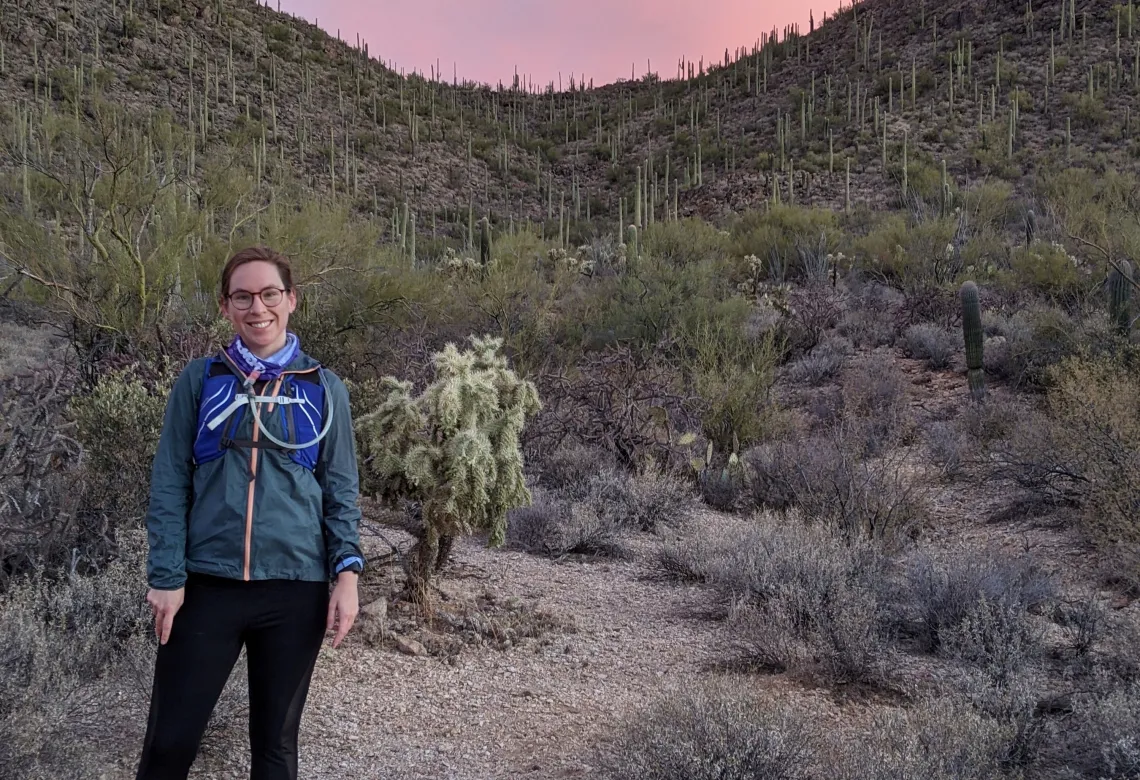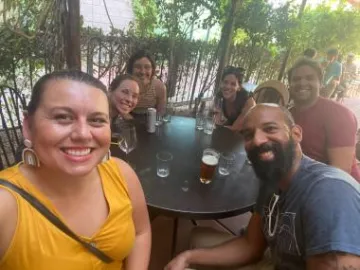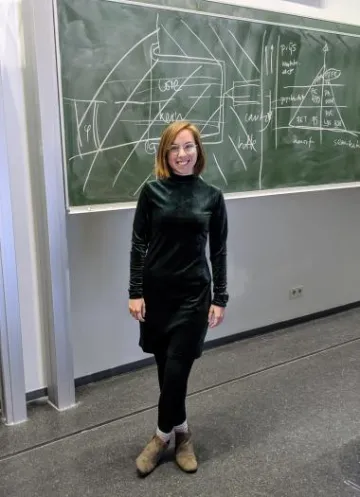DR. CAITLYN HALL AND TEAM AWARDED 2022 CUES SPANNING BOUNDARIES GRANT

Dr. Hall is an avid trail runner, pictured here running in Tucson Mountain Park.
W.A. Franke Honors College Assistant Professor of Practice, Dr. Caitlyn Hall, is an environmental engineer with a passion for interdisciplinary thinking and community-focused science. She and her team of faculty and staff from across the University of Arizona were recently awarded the 2022 CUES Spanning Boundaries grant for their project, Community Stories of Sustainability and Resilience: Sonoran Desert and Baja Regions.
Hall is from Arizona and earned her B.S. and M.S. degrees from the University of Arizona in Biosystems Engineering. She went on to complete her Ph.D. in Environmental Engineering at Arizona State University, conducting research on sustainable methods to reduce earthquake hazards. Much of Hall’s current work and influence embodies an ethos of working with vulnerable communities for equitable disaster prevention.
“Almost all of my work is towards environmental justice and working with communities to make sure that culture is being preserved and communities are protected,” says Hall.
While working towards her Ph.D., Hall had the opportunity to teach biology and geology to inmates at the Arizona State Prison Complex. It was such a positive experience that she decided to pursue teaching full time.
On top of her advocacy for public policy that supports environmental justice, Hall is teaching Franke Honors students, piloting a new minor for the college, and filling the role of project lead on this year's CUES grant.
Hall’s Spanning Boundaries project will engage six different colleges at the University: the W.A. Franke Honors College, the College of Architecture, Planning, and Landscape Architecture, the College of Fine Arts, the College of Engineering, the College of Agriculture and Life Sciences, and the College of Science. Each participating college has a specialized role in the project, allowing for many different educational opportunities for students. The W.A. Franke Honors College will be heavily involved— the core grant team also includes fellow Franke Honors colleagues Laura Horley, Director of Marketing and Communications, and Dr. Lysette Davi, Assistant Director of the Honors Global Experience.
The theme for this year's Spanning Boundaries Challenge, Civic Engagement and Service Learning (CE&SL), was chosen based on outcomes from a workshop conducted in 2021. The goal of CE&SL is to make sure that students are connecting learning with things that are happening outside of the classroom— empowering students to work towards actionable change. For example, students might engage with a community that is impacted by drought and work with that community to implement actionable solutions, rather than only hearing about the community in a lecture hall.

The 2022 CUES Spanning Boundaries team pictured from left to right: Dr. Lyssette Davi, Dr. Caitlyn Hall, Laura Horley, Nicole Antebi, Aaron Bugaj, and Kenneth Kokroko.
Within Community Stories of Sustainability and Resilience: Sonoran Desert and Baja Regions, there is an emphasis on creating opportunities for students and staff to engage in sustainable and mutually beneficial US-Mexico Borderland relationships, with an initial focus on water and food sustainability. The intersecting communities will be Tucson, Arizona; Hermosillo, Sonora; La Paz, Baja Sur; and the Sirebampo and Agiabampo in southern Sonora.
Hall describes the project as, “spanning in different ways—connecting with institutions and community leaders in these locations to create relationships for students to engage with their learning in an interactive way, while also creating resilient solutions for these communities.”
Part of this project involves documenting community members’ stories about issues of sustainability that impact their lives. The hope is for students to go on site to project locations and connect with communities to better understand how they are being impacted. From there, students will develop research plans based on the data they’ve gathered and stories they’ve learned, and support community-driven, long-term solutions. In the classroom, this could look like creating interactive story mapping to communicate lived experiences of residents throughout the borderlands, and developing advocacy tools for public leaders.
“Making sure that these community partnerships are kept is our number one priority throughout this project. The goal is that we don’t want to be extractive.” Hall stated, making a reference to parachute science, a term used when wealthy, Western scientists “parachute” into a community, conduct research, and leave without offering real solutions or creating lasting positive impacts.
Typically, parachute scientists will return to their home base to finish their research without furthering any relationship with the community beyond their own personal gain. This method of research is harmful and often exploitative, taking away from local efforts. The goal of the Spanning Boundaries project is to be collaborative in every way, and it aims to co-create solutions and art while maintaining relationships beyond the project.
This community-focused approach to science is foundational to Hall’s work, as evidenced by the new minor for Franke Honors students, Future Earth Resilience (FER), she will be starting in the fall.

Hall at a science policy lecture to students at Delft University of Technology in the Netherlands.
“When we think about earth resilience, it’s not just ‘will the planet survive?’ it’s also ‘will culture survive?’ It's about different ways of knowing— looking to indigenous communities and learning traditional ecological practices. Resilience is making sure that culture and knowledge stay alive, and that those who are most vulnerable are protected.”
The FER minor will intentionally intersect with the CUES project and allow students to find more ways to be involved in CE&SL. The core pillars of the Future Earth Resilience minor are: relationships between earth processes and people and designing and implementing resilient practices. There is a seamless connection between Community Stories of Sustainability and Resilience and the minor, and at the heart of both is ensuring equitability and justice. More often than not, science-backed solutions and resources are not fairly distributed. The FER minor will encourage students to think critically about the ways that research is conducted, and empathize with the challenges that many communities face in pursuing sustainability.
Community Stories of Sustainability and Resilience: Sonoran Desert and Baja Regions will begin tentative on-site research in the various locations starting in Spring 2023.
Learn more about CUES and the 2022 Spanning Boundaries Challenge

